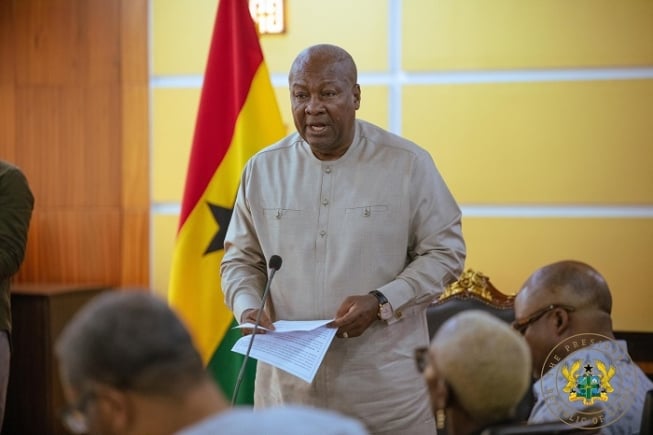Ghana’s President John Dramani Mahama has launched the Accelerated Export Development Advisory Committee (AEDAC), a strategic initiative designed to overhaul the nation’s export sector and significantly boost its contribution to the national economy. The AEDAC’s primary focus is to dismantle the persistent obstacles hindering Ghana’s export competitiveness, including exorbitant transportation costs, inefficient port operations, and bureaucratic red tape that adds unnecessary layers of complexity and expense for exporters. President Mahama emphasized the urgent need to address these challenges, highlighting the significant economic losses incurred due to these inefficiencies. The ultimate goal, he stated, is to propel Ghana’s non-traditional export earnings from the current $3.5 billion annually to a minimum of $10 billion by 2030, transforming Ghana into a robust, export-driven economy.
The AEDAC’s mandate is multifaceted, encompassing strategic advisory roles and guiding national efforts aimed at expanding non-traditional exports and solidifying Ghana’s presence in the global marketplace. President Mahama acknowledged the disproportionately high logistics costs faced by Ghanaian exporters compared to regional counterparts, coupled with protracted export clearance times that exceed West African averages. These factors, he argued, severely undermine Ghana’s ability to compete effectively in international trade. The committee will, therefore, play a crucial role in formulating and implementing policies that streamline export processes, reduce costs, and enhance efficiency across the entire export value chain.
To address the identified infrastructural and procedural bottlenecks, President Mahama outlined a series of targeted interventions. These include the modernization of Ghana’s port facilities, revitalizing the Volta Lake Transport Company, developing the Mpakadan Port, and operationalizing the Buankra Inland Port. These infrastructure projects are intended to improve connectivity, reduce transportation costs, and enhance the overall efficiency of cargo handling. Additionally, the expansion of cold chain infrastructure is planned to support the export of perishable goods like fish and horticultural products, opening up new market opportunities for Ghanaian producers.
Beyond infrastructure development, the initiative also emphasizes regulatory reform. President Mahama acknowledged the detrimental impact of excessive bureaucracy, fragmented oversight, and redundant agency mandates, which contribute significantly to delays and increased costs for businesses. He pointed to estimates from the International Trade Centre indicating that Ghana loses up to $4.3 billion annually in potential export revenue due to these inefficiencies. The AEDAC will work to streamline regulatory processes, simplify technical regulations, and improve access to qualified local laboratories for product testing, thus reducing barriers for exporters and bolstering international confidence in Ghanaian products.
Central to the new export strategy is a shift towards value addition. President Mahama stressed the importance of moving beyond the export of raw materials and focusing on the production and export of finished goods. This strategy requires boosting industrial productivity in key sectors such as fisheries, cashew processing, apparel manufacturing, pharmaceuticals, and machinery. Strengthening Ghana’s energy mix is also considered crucial for supporting increased industrial capacity and facilitating the transition to value-added exports. This focus on value addition is expected to generate greater economic returns, create higher-skilled jobs, and enhance Ghana’s overall competitiveness in the global market.
Another critical component of the initiative is empowering women entrepreneurs within the export sector. President Mahama noted the significant disparity between the representation of women in small and medium enterprises (SMEs) and their participation in export activities. Despite dominating the SME landscape, women account for less than four percent of Ghana’s export volume. Targeted policies and programs will be implemented to address this gap and enable women-owned businesses to participate more actively in export trade, leveraging their entrepreneurial potential and contributing to economic growth. The AEDAC, in collaboration with the Ghana Export Promotion Authority, the Ministry of Trade and Industry, and other stakeholders, will be instrumental in implementing the National Export Development Strategy, aiming to reposition Ghana as a high-performing, export-led economy. This comprehensive approach, encompassing infrastructure development, regulatory reform, value addition, and women’s empowerment, reflects a concerted effort to transform Ghana’s export sector and unlock its full economic potential.


